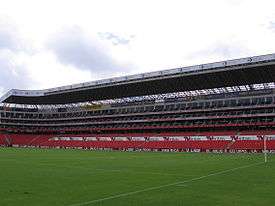Sport in Ecuador
| Part of a series on the |
| Culture of Ecuador |
|---|
 |
| History |
| People |
| Languages |
| Cuisine |
| Religion |
|
Music and performing arts |
|
Media |
| Sport |
|
Sports in Ecuador influence the culture and its people. Soccer or fútbol is the most popular sport, followed by baseball, volleyball, basketball, and tennis.
Since 2005, Ecuador has been greatly involved in sports, and hosted the Guayaquil Marathon in Ecuador's largest city.
Football

Football is the most popular sport in Ecuador. Its best known professional teams include Barcelona and Emelec from Guayaquil, LDU Quito, Deportivo Quito, and El Nacional from Quito, Olmedo from Riobamba, and Deportivo Cuenca from Cuenca.
The national team's matches are the most watched sporting events in the country. In June 2007, FIFA adopted a resolution, prohibiting international football games at or higher than 2,500m above sea level. Rafael Correa, and his presidential counterparts in Peru, Bolivia, and Colombia, issued a joint letter of protest against this ruling. Ecuador qualified for the final rounds of both the 2002 and 2006 FIFA World Cup. Ecuador finished ahead of Poland and Costa Rica, to come in second to Germany in Group A, in the 2006 FIFA World Cup. Futsal, often referred to as índor, is particularly popular for mass participation (usually either on street/concrete or, since recently, turf surfaces).
Tennis

There is a considerable interest in tennis in the middle and upper classes in Ecuadorian society, and several Ecuadorian professional players have attained international fame, including Nicolás Lapentti, Francisco Segura, and Andrés Gómez. As of 2015, Ecuador hosts an ATP World Tour 250 series event, the Ecuador Open Quito as part of the south-american summer clay-court circuit.
Olympics
Ecuador has competed in eleven Summer Olympic Games. They have never competed in the Winter Olympic Games. The nation from South America won its first Olympic medal, when Jefferson Pérez won the gold medal in the Men's 20 km Walk. The Ecuadorian Olympic Committee was created in 1948 and recognized by the IOC in 1959.
Other sports
Basketball has a high profile, especially at amateur (high school and college) level as an alternative to football. It is sometimes considered as the second sport behind football; Ecuador even took part in the inaugural 1950 FIBA World Championship, finishing 8th out of 10 teams. There are regional leagues and a national league, which include clubs and teams from colleges as well.
One of Ecuador's specialties include ecuavóley, a three-person variation of volleyball with more relaxed rules (the ball can be hit with the palm of the hand, and a football is traditionally used). Rugby union is found to some extent in Ecuador, with teams in Guayaquil, Quito, and Cuenca. Pelota nacional, an indigenous racquet sport, is also played. Surfing is popular in some coastal towns. Winter sports are very popular up in the Andes mountains, where it is most available.
There is flourishing activity in non-traditional sports such as inline hockey, capoeira, mountain biking, motorbiking, whitewater kayaking, skiing, snowboarding, and paintball. Martin Davalos, from Pichincha, Quito, is a well-known accomplished AMA motocross and supercross dirtbike rider and racer. Some coastal resorts, particularly Montañita and Ayampe, have been developed as surfing centres. The 2005 World Rafting Championships were held on the Quijos River in Napo Province. Ecuador also hosted the 2007 Youth World Championship for rock climbing, held in Ibarra, becoming the first country outside of Europe or Asia to host the event.
References
| ||||||||||